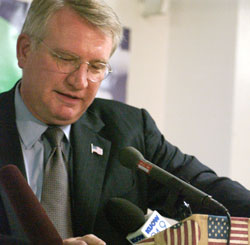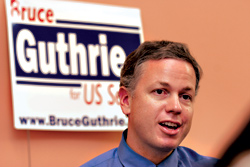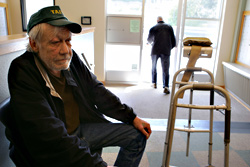EVERY SO OFTEN, you can see a new rip, however small, in the American cultural fabric, a subtle sign that what was once presumed to be a settled issue is now up for grabs. Last week there was a moment at a drug treatment center in Rainier Valley that was one of those times.
Thats when John Walters, the White House drug czar, came to Seattle backed by a platoon of bodyguardsand unwittingly admitted that the feds 60 Years War on marijuana didnt have the grip on the American public that it once did.
Walters announced purpose in coming to town was to stand before the assembled media and say that federal, state, and local agencies should work hand in hand in combating drug use in Seattle, and that more resources should be devoted to the treatment of drug addicts (though he offered no new money for local treatment programs).
Walters decried general drug use (heroin, methamphetamine, and cocaine), and then he got down to the real reason for his trip: to inveigh against Seattles I-75, which was before voters Tuesday, Sept. 16. The local ballot measure would make enforcement of marijuana laws the lowest priority of Seattle police and the city attorneys office, which is responsible for prosecuting misdemeanor pot cases.
Walters called I-75 the result of living in the past and ignorance, a wink and a nod, Lets play dumb on marijuana. Its not the first time Walters has traveled outside the D.C. Beltway and tried to bigfoot a local measure that would soften, however imperceptibly, marijuana laws. He did it last fall in Nevada, and earlier this year officials from his Office of National Drug Control Policy campaigned against a local measure in Missouri. In both cases, he won.
But the Emerald City is harder slogging for the czar than the Silver State.
This week, the measure was winning overwhelmingly before all absentee votes were counted. Surprisingly, Seattles media, even the usually pliant television news, largely declined to help Walters make his case to the public. Only KOMO-TV sent a cameraperson to the press conference, but it didnt air any footage that evening. Other than that, there were only a few print and radio reporters, and their subsequent coverage was hardly the level of drum banging Walters visits have generated elsewhere.
But the Seattle media also missed a shift in the pot war. You had to listen hard, but it was there: Deep in his remarks about I-75, Walters made an admission you wouldnt have heard from federal drug enforcement officials even during the Clinton administration.
The real issue is should we legalize marijuana, Walters said. Lets have a debate about that.
Ever since the 1930s and propaganda films such as Reefer Madness, the feds have waged a multibillion-dollar war on marijuana use. Rarely have they acknowledged that millions of Americans actually like pot and use it responsibly, let alone that there might be a need for a national debate on how America should treat marijuana under the law.
ASKED WHAT FORM the debate would take and how the White House would kick start the process, Waltersusually a polished, intelligent advocate for his positionwent into duck-and-cover mode. He blamed marijuana advocates and their financial backers like billionaire George Soros, who supported last years failed legalization initiative in Nevada, for stifling debate and for preventing clear information from reaching the American public. He also accused them of risking youngsters lives in the deal. Walters had nothing to say about the estimated 700,000 Americans sitting in state and federal prisons on marijuana charges or about the more than 700,000 Americans arrested each year because of poteach of whose lives and well-being is at risk for partaking of a substance that millions in this country (and a country to the north) have accepted as not being the Demon Weed the feds claim it to be.
All the same, what Walters said was an admission pot advocates found amazing.
That is fascinating to hear from the man who on every occasion refuses to debate us, said Bruce Mirken, spokesperson for the Marijuana Policy Project, who added that his group, partially funded by billionaire Peter Lewis, has offered before to square off with the czar. He flat-out refuses. Ill debate John Walters anytime he wants.
Mirken might want to think about warming up with Tom Carr, Seattle city attorney. Carr ran for office in 2001 as the liberal answer to years of civil-rights-abusing Mark Sidran. But in introducing Walters at the press conference, Carr sounded like he was applying to become deputy drug czar.
Saying that he was proud to stand shoulder to shoulder with Walters, Carr said that I-75 would have us look away from the marijuana problem.
But in an interview last month, Carr described his opposition to I-75 as a 5 on a scale of 1 to 10 and never portrayed marijuana as a sizable problem in Seattle.
Many Seattleites would seem to agree, based on this weeks vote. The tally late Tuesday night had I-75 winning by more than a 15 percent margin.








